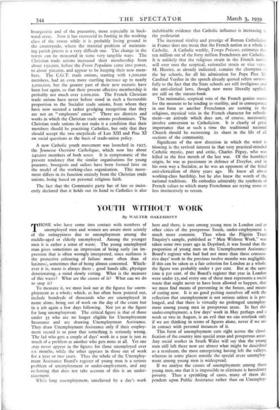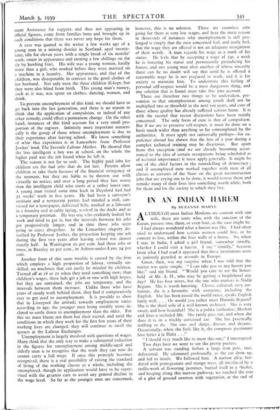YOUTH WITHOUT WORK
By WALTER OAKESHOTT
THOSE who have come into contact with numbers of unemployed men and women are aware most acutely of the unhappiness due to unemployment among the middle-aged or elderly unemployed. Among the younger men it is rather a sense of waste. The young unemployed man gives sometimes an impression of being surly (an im- pression that is often wrongly interpreted, since surliness is the protective colouring of failure more often than of laziness), sometimes that of being almost contented. Which- ever it is, waste is always there ; good hands idle, physique deteriorating, a mind slowly rotting. What is the measure of this waste? What are the causes of it? What can we do to stop it?
To measure it, we must look not at the figures for unem- ployment as a whole; which, as has often been pointed out, include hundreds of thousands who are unemployed in name alone, being out of work on the day of the count but in a job again a few days following. Nor yet at the figure for long unemployment. The critical figure is that of those under 35 who are no longer eligible for Unemployment Insurance and are drawing Unemployment Assistance. They draw Unemployment Assistance only if their employ- ment record is so poor that something is seriously wrong. The lad who gets a couple of days' work in a year is just as much of a problem as another who gets none at all. Yet one may never appear in the figures for those unemployed over six months, while the other appears in those out of work for a year or two years. Thus the whole of the Unemploy- ment Assistance Board's register of young men is a serious pi oblem of unemployment or under-employment, and any reckoning that does not take account of this is an under- statement.
While long unemployment, unrelieved by a day's work here and there, is rare among young men in London and in other cities of the prosperous South, under-employment is much more common. Thus when the Pilgrim Trust Enquiry's sample, published as " Men Without Work," was taken some two years ago in Deptford, it was found that the proportion of young men on the Unemployment Assistance Board's register who had had not more than three consecu- tive days' work in the previous twelve months was negligible. If this can be taken as a fair criterion for London as a whole. the figure was probably under 1 per cent. But at the same time 9 per cent. of the Board's register that year in London were under 25, and every one of these men represents a social waste that ought never to have been allowed to happen, that we must find means of preventing in the future, and means of curing now. It is no good putting ourselves off with the reflection that unemployment is not serious unless it is pro- longed, and that there is virtually no prolonged unemploy- ment among young men in prosperous areas. In fact this under-employment, a few days' work in May perhaps and a week or two in August, is an evil that we can overlook only if we are thinking in terms of figures alone, never if we are in contact with personal instances of it.
This form of unemployment cuts right across the classi- fication of the country into special areas and prosperous areas. Any social worker in South Wales will say that the young men still left there now are almost what might be described as a residuum, the most enterprising having left the valleys. whereas in some places outside the special areas unemploy- ment among young men is widespread.
If we analyse the causes of unemployment among these young men, one that it is impossible to eliminate is hereditary poverty. Thus a sprinkling of cases, many of them de- pendent upon Public Assistance rather than on Unemploy- ment Assistance for support, and thus not appearing in official figures, come from families born and brought up in such conditions that there was never any hope for them.
A case was quoted to the writer a few weeks ago of a young man in a mining district in Scotland, aged twenty- nine, idle for eleven years with a single break of six months' work, smart in appearance and earning a few shillings on the sly by hawking fruit., His wife was a young woman, hardly more than a girl, who worked before they were married on a machine in a laundry. Her appearance, and that of the children, was disreputable in contrast to the good clothes of her husband. Not only were the three children ill-kept, but they were also blind from birth. This young man's money, such as it was, was spent on clothes, dancing, women, and drink.
To prevent unemployment of this kind, we should have to go back into the last generation, and there is no reason to think that the application of compulsion, or indeed of any other remedy, could effect a permanent change. On the other hand, instances of this kind account for a very small pro- portion of the register. Infinitely more important numeri- cally is the group of those whose unemployment is due to their experience after leaving school. We know something of what that experience is in Lancashire from Professor Jewkes' book The juvenile Labour Market. He showed that the less intelligent a boy was at school, on the whole the higher paid was the job found when he left it.
The reason is not far to seek. The highly paid jobs for children are the bad jobs that do not last. Parents allow children to take them because of the financial stringency of the moment, but they are liable to be thrown out with virtually no notice, and over a long period they fare worse than the intelligent child who starts at a rather lower rate. A young man visited some time back in Deptford had had 32 weeks' work in five years. He had been a surveyor's assistant and a restaurant porter, had minded a stall, can- vassed for a newspaper, delivered bills, worked as a labourer in a foundry and at cable laying, worked in the docks and as a temporary postman. He was one who evidently looked for Arork and tried to get it, but the intervals between his jobs got progressively longer, and in time those jobs were going to cease altogether. In the Lancashire enquiry de- scribed by Professor Jewkes, the proportion keeping one job during the first two years after leaving school was almost exactly half. In Warrington 20 per cent. had three jobs or more, in Burnley 20 per cent., in Ashton-under-Lyne 24 per cent.
Another form of this same trouble is caused by the firm which employs a high proportion of labour, virtually un- skilled, on machines that can easily be minded by children. Turned off at 18 or 21 when they need something more than children's wages, these lads get a job or two with high hopes, but they are untrained, the jobs are temporary, and the intervals between them increase. Unlike those who have years of steady work behind them, they find it comparatively easy to get used to unemployment. It is possible to show that in Liverpool the attitude towards employment varies according to age, the younger men being notably more in- clined to settle down to unemployment than the older. For this we must blame not them but their record, and until the conditions in which they work for the first few years of their working lives are changed, they will continue to swell the queues at the Labour Exchanges.
Unemployment is largely involved with questions of wages. Many think that the only way to make a substantial reduction in the figures for unemployment among middle-aged and elderly men is to recognise that the work they can now do cannot carry a full wage. If once this principle becomes recognised, there is a real possibility of raising the standard of living of the working classes as a whole, including the unemployed, though its application would have to be super- vised with the greatest care to avoid any general decline in the wage level. So far as the younger men are concerned, however, this is no solution. There are countless jobs going for them at very low wages, and here the main reason in thousands of instances why unemployment is still pro- longed is simply that the men concerned feel, and justly feel, that the wage they are offered is not an adequate recognition of their worth. A man regards his wage as a mark of his status. He feels that by accepting a wage of 24s. a week he is lowering his status and permanently prejudicing his future, and one young man after another of whose sincerity there can be no doubt will say that until he is offered a reasonable wage he is not prepared to work, and it is for society to maintain him. To undermine this feeling of personal self-respect would be a most dangerous thing, and any solution that is found must take this into account.
There are therefore two things to be undertaken, pre- vention so that unemployment among youth shall not be multiplied two or threefold in the next ten years, and cure of those whose quality has already suffered serious harm. It is with the second that recent discussions have been mainly concerned. The only form of cure is that of compulsion. But if we are to preserve self-respect, it must be done on a basis much wider than anything so far contemplated by the authorities. It must apply not universally perhaps—for ex- perience abroad has shown that the loss of a year during a complex technical training may be disastrous. But apart from this exception (and we are already becoming accus- tomed to the idea of certain occupations being scheduled as of national importance) it must apply generally. It might be one of the chief factors in the remodelling of democracy ; and if unemployed men worked together with men of all classes as servants of the State on the great reconstruction jobs that are crying out to be done, it would restore them and remake many of their lives into something worth while, both for them and for the society in which they live.



























































 Previous page
Previous page